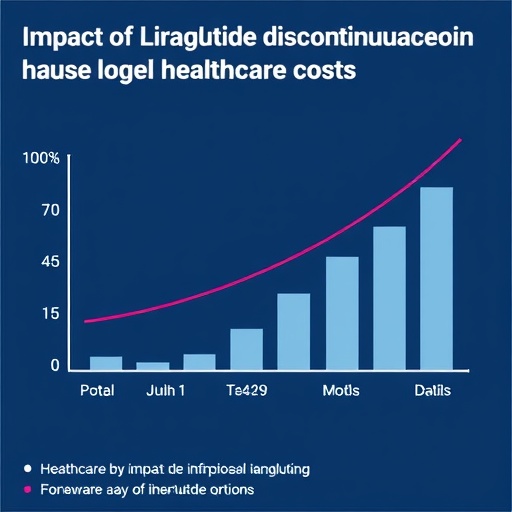In the realm of diabetes treatment, few developments have garnered more attention and scrutiny than the introduction of once-weekly injectable therapies. A recent study sheds light on the healthcare resource utilization and costs associated with individuals who either discontinue liraglutide or switch to semaglutide, another injectable diabetes medication. This research is pivotal as it addresses the shifting landscape of diabetes management and the financial implications for patients and healthcare systems alike.
Liraglutide has been a cornerstone in the treatment of type 2 diabetes for several years. As a glucagon-like peptide-1 (GLP-1) receptor agonist, it plays a critical role in stimulating insulin secretion in response to elevated blood glucose levels while also suppressing appetite, which, in turn, aids weight loss. However, adherence to liraglutide can be challenging for some patients due to its daily dosing schedule. This frequent administration can be burdensome, potentially contributing to medication non-adherence and ultimately impacting overall treatment efficacy.
The study in question meticulously examined the demographics and health outcomes of patients who discontinued liraglutide therapy. Among the key findings was the alarming rate of discontinuation and the factors that influenced these decisions. Researchers observed that various parameters, including side effects and perceived ineffectiveness, often played significant roles in driving patients away from this treatment option. Understanding these factors is critical for healthcare providers as it underscores the need for ongoing patient support and education, particularly in managing expectations around medication efficacy and potential adverse events.
Furthermore, the research casts a spotlight on the subsequent decisions patients make after discontinuing liraglutide. Transitioning to semaglutide represents a significant shift in treatment strategy and, for many, offers a glimmer of hope. Semaglutide, also a GLP-1 receptor agonist, boasts the convenience of a once-weekly injection, which can alleviate some of the burdens associated with daily dosing. This convenience not only enhances the patient experience but may lead to improved medication adherence and better health outcomes.
The financial implications of these medications cannot be overlooked. The study evaluated the healthcare resource utilization associated with both liraglutide and semaglutide, providing an insightful comparison for healthcare providers and policymakers alike. As healthcare costs continue to rise, understanding the economic impacts of treatment decisions is paramount. For patients, switching from daily to weekly injections could translate to fewer pharmacy visits and consultations, potentially reducing their out-of-pocket expenses and the overall burden on the healthcare system.
Moreover, the analysis encompassed a detailed look at the costs associated with managing complications arising from diabetes. With an increasing emphasis on value-based care, this aspect of the research is particularly relevant. It elucidates how switching to a more effective treatment regimen could mitigate the long-term complications associated with poorly managed diabetes, ultimately leading to cost savings for both patients and healthcare providers.
The study’s findings may also serve as a catalyst for further research into patient preferences and treatment satisfaction. As patient-centered care becomes a focal point in healthcare, it is crucial to explore how treatment modalities align with the personal values and lifestyles of individuals living with diabetes. Gathering insights from patient-reported outcomes can help shape future therapies and improve engagement in diabetes management.
In addition, the research emphasizes the importance of collaborative decision-making between patients and healthcare providers. The dialogue surrounding treatment options must be inclusive, taking into account the individual experiences and concerns of patients. By fostering an environment of open communication, healthcare providers can better navigate the complexities of diabetes management and tailor treatment plans that resonate with their patients.
As the landscape of diabetes care continues to evolve, it is evident that the need for innovative treatment options remains paramount. Ongoing research efforts must focus on not only the efficacy of new medications but also the economic ramifications and patient experiences associated with these therapies. The transition from liraglutide to semaglutide illustrates the dynamic nature of diabetes treatment and underscores the importance of making informed decisions.
In conclusion, the study conducted by Tan et al. highlights critical insights into healthcare resource utilization and costs among individuals transitioning from liraglutide to semaglutide. The findings underscore the importance of addressing patient needs, enhancing treatment adherence, and ultimately contributing to better health outcomes. The implications of this research extend far beyond the individual patient, influencing healthcare practices and policies aimed at improving diabetes management. The future of diabetes care will hinge on our ability to incorporate these findings into practice, ensuring that patients receive not only effective but also accessible and economically viable treatment options.
As we continue to explore the complexities of diabetes management, the journey from liraglutide to semaglutide could represent a turning point, paving the way for more effective, patient-centered care in the years to come.
Subject of Research: Healthcare Resource Utilization and Costs in Diabetes Treatment Transition from Liraglutide to Semaglutide
Article Title: Healthcare Resource Utilization and Costs in Individuals Who Discontinue Liraglutide and Who Switch from Liraglutide to Once-Weekly Injectable Semaglutide.
Article References:
Tan, X., Brady, B.L., Xie, L. et al. Healthcare Resource Utilization and Costs in Individuals Who Discontinue Liraglutide and Who Switch from Liraglutide to Once-Weekly Injectable Semaglutide.
Diabetes Ther 16, 1417–1433 (2025). https://doi.org/10.1007/s13300-025-01741-8
Image Credits: AI Generated
DOI: https://doi.org/10.1007/s13300-025-01741-8
Keywords: Diabetes Management, Liraglutide, Semaglutide, Healthcare Costs, Patient Experience.




